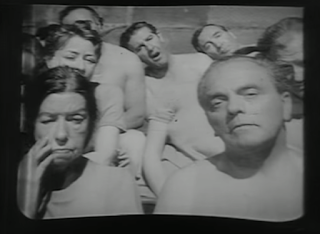** this post contains major spoilers **
I watched this expecting "In the Company of Women," but it lacks the scandalous energy that made Neil LaBute's debut worth watching. The two leads are good, but the characters cliche (actually, they describe each other as such). Stockard Channing is Julie, a veteran exec who's had to eat (extra) shit in a man's world. Recently promoted to CEO, her personal life's a desert. On a business trip she bonds with young counterpart Paula (Julia Stiles), an underemployed cynic who messes with people, compulsively.
The third character is a plot device: a handsome headhunter (Fred Weller, star of LaBute's The Shape of Things) hired by Julie. Paula tells Julie that in college, he date-raped her friend (in a later version, Paula herself). Over drinks, the vengeful women roofie the man, then leave him half-naked in a deserted area of the hotel, slurs marking his body. The ironic sting: on waking he's bemused, and assumes a wild night.
In the Company of Men sustained interest with gratuitously cruel behavior, and reappraisal of who's been damaged, but The Business of Strangers teases wild behavior that's more of a postmodern prank. A twist ending indicates the rape never happened, further obscuring the point: is it that capitalism destroys ethics? -- age before gender? -- hotels need better security?
Or perhaps triviality itself: that in a male-dominated (pop) culture, the actions of women diminish. Maybe so, but as presented here it's thin and stagey for a feature film. Writer-director Patrick Stettner made just one subsequent feature, The Night Listener (2006).
I watched this expecting "In the Company of Women," but it lacks the scandalous energy that made Neil LaBute's debut worth watching. The two leads are good, but the characters cliche (actually, they describe each other as such). Stockard Channing is Julie, a veteran exec who's had to eat (extra) shit in a man's world. Recently promoted to CEO, her personal life's a desert. On a business trip she bonds with young counterpart Paula (Julia Stiles), an underemployed cynic who messes with people, compulsively.
 |
| Julia Stiles, edgy as ever |
The third character is a plot device: a handsome headhunter (Fred Weller, star of LaBute's The Shape of Things) hired by Julie. Paula tells Julie that in college, he date-raped her friend (in a later version, Paula herself). Over drinks, the vengeful women roofie the man, then leave him half-naked in a deserted area of the hotel, slurs marking his body. The ironic sting: on waking he's bemused, and assumes a wild night.
In the Company of Men sustained interest with gratuitously cruel behavior, and reappraisal of who's been damaged, but The Business of Strangers teases wild behavior that's more of a postmodern prank. A twist ending indicates the rape never happened, further obscuring the point: is it that capitalism destroys ethics? -- age before gender? -- hotels need better security?
Or perhaps triviality itself: that in a male-dominated (pop) culture, the actions of women diminish. Maybe so, but as presented here it's thin and stagey for a feature film. Writer-director Patrick Stettner made just one subsequent feature, The Night Listener (2006).








